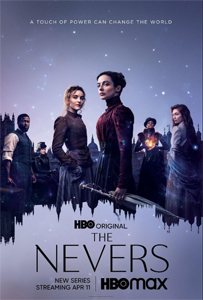In his first series since “Marvel’s Agents of S.H.I.E.L.D.” (2013) and his first hands-on series since “Dollhouse” (2008), Joss Whedon returns to TV with “The Nevers” (Sundays, HBO Max). It has snuck under the radar in part because we found out a couple months ago that Whedon is allegedly often a jerk to cast and crew, thus dulling the excitement factor. Plus, Whedon exited the series after six produced episodes, citing exhaustion, handing the reins to Philippa Goslett.
Whedon flavor is back
Still, after watching two episodes – the first written and directed by Whedon, the second written by Jane Espenson and directed by Whedon – there’s no denying the 1990s-2000s Whedon flavor is back. This is HBO, so there’s more nudity and slightly more violence and scenes that run longer than we’re used to, but “The Nevers” is recognizably Whedonesque.
It’s there in the witticisms. Hugo (James Norton) has told shy Augustus (Tom Riley) to flirt with the ugly girl if he’s nervous. “Which one’s the ugly one?” Augustus whispers upon seeing equally gorgeous Amalia (Laura Donnelly) and Penance (Ann Skelly). It’s there in tropes ranging from broad – superpowered yet oppressed women – to specific. Primrose (Anna Devlin) is 15 feet tall, calling to mind Dawn from the “Buffy” Season 8 comics.
“The Nevers” Season 1 (2021)
Sundays, HBO Max
Creator: Joss Whedon
Stars: James Norton, Laura Donnelly, Ann Skelly
In addition to reminding us of what we love about the catalogs of Whedon, Espenson and Douglas Petrie (also on the writing team, although he’s not credited in the initial six eps), “The Nevers” taps into the Nineties nostalgia boom … 1890s, that is. Calling to mind “The Alienist” and “Carnival Row,” “The Nevers” is gorgeous to look at as it recreates late 19th century London by filming in the city itself.
Cute Victorian romance
The story is more compelling than on those other shows – we can see the complex yet graspable mythology taking root – and the characters are at least the equal of “The Alienist,” with Augustus-and-Penance displacing John-and-Sarah as my favorite Victorian TV couple.
This is thanks to a delightful sequence in Espenson’s episode where Augustus, trained by older sister Lavinia (Olivia Williams, “Dollhouse”) to be staid and proper, lights up when telling Penance about the sensation of flying.
Augustus’ power (“turn” in “Nevers’ ” terminology) is to temporarily possess a crow and see through its eyes. As we see in a flashback, men and women in equal numbers were “touched” (or “toeched,” in Penanace’s delightful Irish accent) by a glowing alien entity that dropped sparkles from the sky three years ago.
But owing to a Salem-witch-hunt type of worry among British rulers, it’s the powered women who are in danger of being squashed by the establishment. Lavinia’s London enclave lightly disguised as an orphanage provides the Touched, if not safety, at least a reprieve from loneliness, as Amalia puts it. Xavier’s School for Gifted Mutants comes to mind, as does Buffy’s Scottish castle headquarters for Slayers in Season 8.

Powers in place
As with the “Buffy” comics — the 2010s Whedon project that most interested me, although his Marvel Cinematic Universe work is more famous – the villains and mythology are in place. There’s a crazy Touched person, Amy Manson’s Maladie, plus Denis O’Hare’s Dr. Hague, who performs brutal brain surgery on the Touched, plus the government’s inner circle.
Also as with those comics, personalities and arcs interest me more than the broad story. Amalia’s story has been told out of order, as we know she has a connection to Maladie, but she isn’t telling us yet. Amalia is often equaled or outshined by the deep supporting cast, but by the end of two episodes, I accept her as the lead.
While the superpowers on, say, the “X-Men” series “The Gifted” feel old-hat, “The Nevers” pulls off an impressive trick of making powers interesting again because they are so interwoven with each personality. Amalia gets glimpses of the near future, Penance is a genius steampunk inventor, and Myrtle (Viola Prettejohn) speaks and understands all languages.
Grounded fantasy
Because of this, “The Nevers” is a nicely grounded brand of fantasy, like the Buffyverse. Penance’s steampunk inventions are cool (I love the motorcar), but the whole world is not steampunk, so her inventions will scare the powers that be. Lavinia, whose loyalties and interests are convoluted, is digging up that flying device that sprinkled people with powers.
“The Nevers” is not as original as Whedon’s Big Four series; this is ultimately a Victorian “X-Men” – albeit a very good Victorian “X-Men.” And I’m nagged by the feeling that the series, by being set in the past, is limited whereas his modern-day or futuristic shows were not.
Yet “The Nevers” has set a tone where wild sci-fi and fantasy have a place, so things need not snap back to the known reality, with the story of the Touched being left out of the history books. There are lots of possibilities here, and I’m easily on board for the rest of Season 1.

